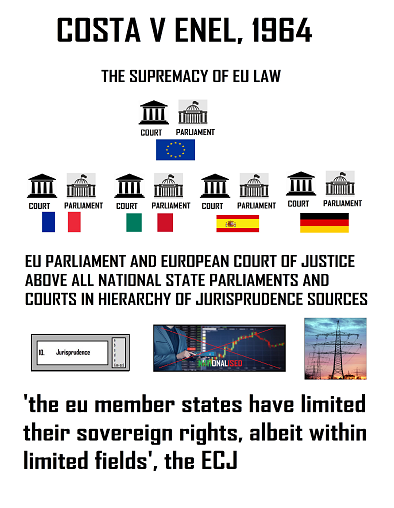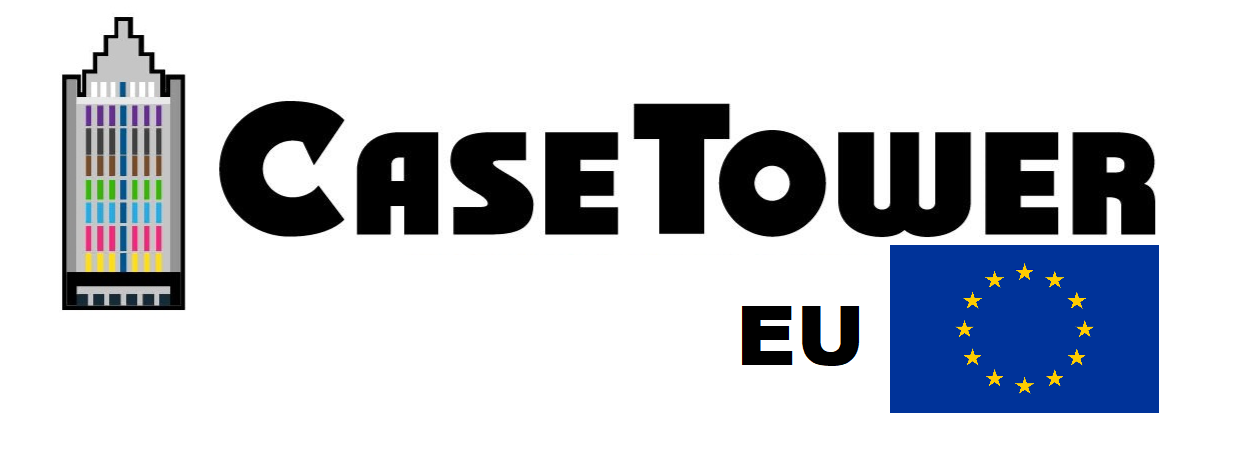Costa v Enel, Case 6/1964, ECJ
Citation: Costa v Enel, Case 6/1964, ECJ
Rule of thumb: What happens if national law & EU law are in direct contrast? This is arguably the most famous case in EU law and it affirmed the golden rule of EU jurisprudence - this case affirmed the 'supremacy of EU law' above national states' laws. When EU laws and national laws are in direct conflict EU law is above national state law in the hierarchy. It affirmed the public international law principle that when national states joined the EU they limited their sovereignty in many law subjects in order to have the EU as an open market where people and businesses could freely trade with all the other 500 million + people living in the EU.
Facts & arguments:
The facts were that Costa was an Italian citizen. He owned shares in the energy company ENEL. However, ENEL was set to be nationalised by a statute introduced by the Italian Government. Costa was not happy about this nationalisation of ENEL by the Italian Government. In protest Costa refused to pay his electricity bill to nationalised ENEL of around 2,000 lire, and so the matter went to Court Costa argued that he did not owe Italian Government ENEL any money based on the contract law principle of illegality & lien over other damages the organisation owed him - he argued that the process under which this nationalisation took place was illegal entitling the Italian Government version of ENEL to no money from him. Costa argued that the nationalisation of ENEL argued that this nationalisation of ENEL breached the EU Treaty of Rome and the Italian Constitution. ENEL presented the Italian statute showing that the full nationalisation had been acted democratically through an Italian legislative act and was all done perfectly legally and properly. Enel also presented Judgement to the European Court of Justice from the Italian Supreme Court stating that EU laws and Italian laws had equal status in the hierarchy of jurisprudence sources. The Italian Supreme Court in their Judgement stated that the standard statutory interpretation principle of a more recently introduced statute having precedence over an older statute introduced - when the 2 are in direct conflict - applied in this matter. The Italian Court therefore stated that as the Italian statute had been introduced after the EU Treaty of Rome then the Italian statute took prioriy over the EU law source. Costa argued that this point of jurisprudence was wrong - he argued that EU laws had a higher jurisprudence status than national laws, such as the national laws, even if national laws like the ones in question were introduced afterwards.
Judgment:
The ECJ upheld the arguments Costa was making about jurisprudence. Costa overall won this case against ENEL. The ECJ stated that this was a wrong interpretation by the Italian Courts. The ECJ stated that EU law takes priority over national law, even if national laws are introduced after EU laws, meaning that the Treaty of Rome had a higher legal status as a source of law than the Italian statute nationalising the energy company. The ECJ did not declare the nationalisation of ENEL illegal. The ECJ referred this matter back to the Italian Courts to interpret again, except this time interpret the law in the matter with them knowing that the Treaty of Rome had a higher status than the Italian statute introduced. In short, this case affirmed the supremacy of EU law over national state laws when the 2 are in direct conflict. Costa did not win his case as such about ENEL being privatised with this Judgement, however he did win his jurisprudence legal argument with the Italian Court that their Judgement contained an error of law regarding the supremacy of EU law over Italian laws or the laws of any national state, with the case having to be reconsidered properly in the Italian Courts.
'As opposed to other international treaties, the Treaty instituting the E.E.C. has created its own order, which was integrated with the national order of the member-States the moment the Treaty came into force; as such it is binding upon them. In fact, by creating a Community of unlimited duration, having its own institutions, its own personality and its own capacity in law, 2/4 apart from having international standing and more particularly, real powers resulting from a limitation of competence or a transfer of powers from the States to the Community, the member-States, albeit within limited spheres, have restricted their sovereign rights and created a body of law applicable both to their nationals and to themselves. The reception, within the laws of each member-State, of provisions having a Community source, and more particularly of the terms and of the spirit of the Treaty, has as a corollary the impossibility, for the member-State, to give preference to a unilateral and subsequent measure against a legal order accepted by them on a basis of reciprocity. [...] It follows from all these observations that the law stemming from the treaty, an independent source of law, could not, because of its special and original nature, be overridden by domestic legal provisions, however framed, without being deprived of its character as community law and without the legal basis of the community itself being called into question’.
'... a transfer of powers from the States to the Community... the member states... have restricted their sovereign rights and created a body of law applicable to both their nationals and themselves... The Treaty of Rome... could not... be overridden by domestic legal provisions', the ECJ
'the Members States have limited their sovereign rights, albeit within limited fields', the ECJ

Warning: This is not professional legal advice. This is not professional legal education advice. Please obtain professional guidance before embarking on any legal course of action. This is just an interpretation of a Judgment by persons of legal insight & varying levels of legal specialism, experience & expertise. Please read the Judgment yourself and form your own interpretation of it with professional assistance.

